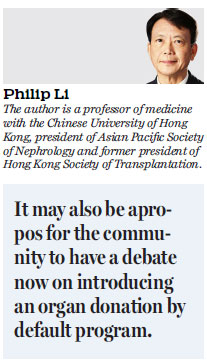Live organ donation ethics need careful consideration
Updated: 2017-04-21 08:49
By Philip Li(HK Edition)
|
|||||||||
Philip Li says criteria such as donor's age cannot be taken lightly and changes to the rules need thorough discussion
Chronic diseases are the leading causes of death and disability globally. It was projected that approximately 50 million people will die of chronic diseases annually by 2020. This is related to the growing aging population and the increase in the comorbid (a medical condition that co-occurs with another) illnesses of the population. One of the consequences is the increasing incidences of organ failure that can occur. End-stage organ failures involving kidney, liver, heart and lungs are potentially or immediately life threatening. In Hong Kong, organ transplants involving these patients are lifesaving procedures with good chances of success and the availability of organs is, in many circumstances, the limiting factor to save that patient's life.
Last year there were more than 2,000 end-stage kidney failure patients waiting for kidney transplants in Hong Kong while there were only 60 kidney transplants from deceased donors, and 18 live kidney transplants. Over the past five years, there were on average about 100 patients awaiting liver transplants while on average only about 30 to 50 liver transplants from deceased donors and about a similar number of live liver transplants occur in Hong Kong each year.

Organ donation is an area where ethical challenges can never be understated; these potentially affect clinicians, donors and their families, recipients and their families and the community at large. The four major areas of biomedical ethics: Respect of autonomy, non-maleficence (obligation not to inflict harm intentionally), beneficence (done for the benefit of others) and justice come into play when organ donation together with organ allocations is considered.
The recent issue of legal age for live organ donation, whether it should be lowered or discretionary power be given, has created heated discussion in Hong Kong.
In the assessment and selection of living organ donors, in-depth physical and psychosocial assessments are crucial. The process should be guided by ethical principles to protect the donor. To provide informed consent, potential donors should be free from coercion, have the capacity to make the donation decision independently, have all relevant information and comprehension of potential outcomes. The clinical team taking care of the transplant should understand the donor's motives, commitment and views on the trade-off between the risks and non-medical benefits of donations.
According to the Human Organ Transplant Ordinance of Hong Kong, the requirement of the donor includes: The donor concerned has reached the age of 18; the donor has given his/her consent to the proposed organ removal without coercion or the offer of inducement and has not subsequently withdrawn his/her consent.
It is not difficult to understand that the age criterion is to protect the minors of society. The controversy lies in whether 18 years of age is the right minimum age for such a decision.
Medical practice aims to do "no harm" to healthy people but live organ donation can be viewed as going against this premise. It is important to realize the ethical implications and the potential psychological morbidity should not be underestimated, even to an adult over 18 years of age. In addition, the donor may be under direct or implied pressure from family or the patient to donate, with a perceived obligation to proceed with the operation. Coercion in any form can have a detrimental impact on the donor's ability to make a balanced decision regarding the risks and benefits of the procedure for both parties involved. At the same time, despite rigorous and elaborate preoperative investigation and assessment, the transplanted organ may fail or be rejected. This can have devastating psychological sequelae (the consequence of a previous disease or injury) and potential donors need extensive counseling to consider the risks carefully.
In Hong Kong, a living donor below 18 is not legally allowed and such protection by the law should be respected. The legal age for making such decisions may vary between countries. However, any change should be preceded by an extensive discussion within the society taking into consideration the prevailing social and cultural conditions as well as the latest scientific evidence. The emotions of trying urgently to save a life may clash against the risks and legality of amending the law on an ad hoc basis. The recent case sparked widespread discussion about how someone three months short of the legal age should be given due consideration for donation as an exception. Then controversies will heighten if the gap to 18 years old widens to 6 months, 12 months or even 18 months and so on. Every time there will be calls for making exceptions to the law which faces a serious challenge to its original intention to protect the minors who may be pressurized, really or virtually, to become "unwilling" donors.
The altruism of the live donor for the liver failure patient in the recent incident is most admirable. It is also sad to note a potentially suitable deceased liver donation could not materialize during this period. The deceased organ donation situation in Hong Kong is far from satisfactory. A lot of work from the government, Hospital Authority and the whole transplant community of Hong Kong has been done to promote organ donation. It can only be hoped that with more deceased and live organ donations, the call for such controversy will not need to happen again. It may also be apropos for the community to have a debate now on introducing an organ donation by default program.
(HK Edition 04/21/2017 page1)